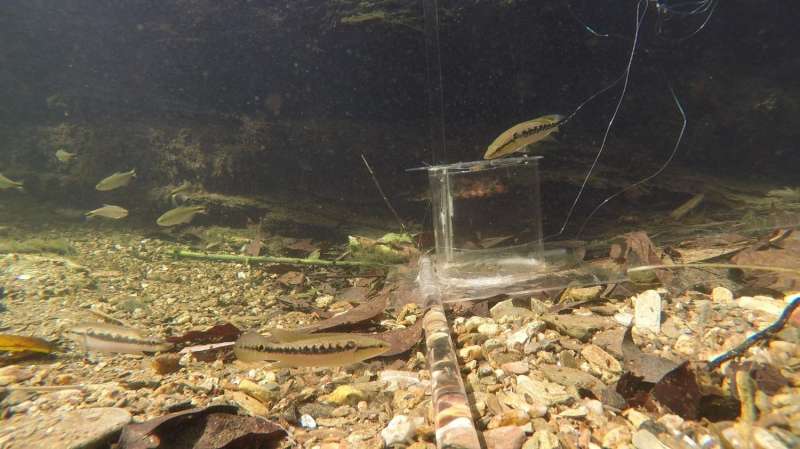Fish step up to lead when predators are near

Researchers from the University of Bristol have discovered that some fish within a shoal take on the responsibilities of leader when they are under threat from predators.
The findings, reported today in Science Advances and funded by the UK's Natural Environment Research Council, suggest that the majority of decisions made by the leader fish are followed, making the shoals more effective.
And it was the shoals where fish had defined leader/follower roles that were more evident in areas where predators were more prevalent. Dr Christos Ioannou from the university's School of Biological Sciences, said: "There are many benefits of group living, and making decisions together can dramatically increase the survival of many species - this is why many birds flock and fish shoal.
"Groups can be guided by leaders, where a single individual makes most of the decisions, or egalitarian, where everyone contributes.
Dr Christos Ioannou and colleagues found that guppies from areas with high predation differentiate more into either leaders or followers. This is the first evidence that predators may influence how individuals contribute to decisions in groups.
Behaviour of over 300 fish from rivers with varying predation risk was studied.
Fish were placed in a maze, and decision making and shoal cohesion for each fish in each shoal was measured using advanced computer tracking software.
It was found that the majority of decisions made by a leading fish are followed, leading to high shoal cohesion overall. Moreover, it was the shoals that were less egalitarian that were more cohesive in high predation fish.
Dr Ioannou added: "The study shows that decision making in social groups within a species can vary depending on predation, even within a small geographical range.
"Changes in decision making may be a direct response to predation risk, but we need further experiments to test this.
"This research is important as it shows that social behaviour can adapt depending on ecological factors. This could have a wider impact when considering how changes in species communities, for example due to climate change or invasive species, affects social prey."
More information: 'High-predation habitats impact the social dynamics of collective exploration in a shoaling fish' by C. Ioannou, I. Ramnarine and C. Torney in Science Advances advances.sciencemag.org/content/3/5/e1602682
Journal information: Science Advances
Provided by University of Bristol




















